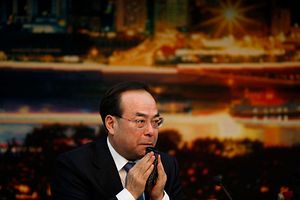On February 13, China’s state news agency Xinhua revealed that Sun Zhengcai — the former top leader of Chongqing city — had been officially charged with bribery.
Sun, 55, also a member of the Politburo of the 18th Central Committee of the Communist Party of China (CPC), was once widely believed to be a promising contender for China’s top leadership positions. But now, he is only one step away from prison.
As The Diplomat has been closely following, in mid December last year, China’s Supreme People’s Procuratorate (SPP) announced that it had opened an investigation against Sun “on suspicion of accepting bribes” and had taken “coercive measures” against him. Xinhua explained that these measures may include summons by force, bail, and detention. In China, such formal legal steps against a high-ranking Party member come only after the Communist Party has completed it own investigation and expelled the official in question — and thus a guilty verdict in the courts is assured.
Xinhua’s latest report said that the SPP has recently completed its investigation and transferred the case to the first branch of Tianjin People’s Procuratorate for review and prosecution according to law.
The first branch of Tianjin People’s Procuratorate has filed public prosecution against Sun to the First Intermediate People’s Court of Tianjin. Meanwhile, the prosecutors “have informed Sun of his litigation rights, interrogated him, and listened to his lawyer’s opinions,” Xinhua said.
Citing the indictment, Xinhua declared that “Sun is accused of taking advantage of his posts to seek profits for others and illegally accepted huge amounts of money and property” throughout the past decade and a half: “while serving as CPC chief of Shunyi District, Beijing, Standing Committee member and secretary general of the CPC Beijing Municipal Committee, agriculture minister, secretary of the CPC Jilin Provincial Committee, Political Bureau member of the CPC Central Committee, and Party chief of Chongqing Municipality.”
According to Sun’s resume, he was appointed Party chief of Shunyi District, Beijing in 2002. Based on the indictment, from that point until July 2017 — when he was abruptly removed from his position as the Party secretary of Chongqing — Sun had been constantly taking advantage of his positions. That 15-year span covers almost all of Sun’s political career (Sun worked in academia from the 1980s to the mid-1990s).
Besides the charges of bribery, in September last year, the Politburo of the CPC had announced that Sun’s misconduct also included losing faith in communism, betraying the Party’s principles, ignoring the Party’s code of conduct and rules, seeking ostentation and privileges for himself, engaging in nepotism, abusing power and influence, being bureaucratic, lazy, and inactive at work, leaking confidential Party information, and trading power for sex.
Notably, focusing on Sun’s alleged “trading power for sex,” one of China’s most prominent media outlets, Caixin, published several articles in recent weeks, digging into the several people who had “special relationships” with Sun.
In its most recent exclusive story, published on February 6, Caixin directly focused its spotlight on one of Sun’s mistresses (according to rumors, Sun has multiple mistresses and illegitimate children).
In the article, title “The Mistress Who Ruled Chongqing,” Caixin reported that Liu Fengzhou, 55, a government employee turned entrepreneur, art collector, and Buddhist, started a relationship with Sun in the 1990s. She expanded her business to all localities where Sun had held office in the following years.
Such sensationalist reports on a former senior politician — even if the politician has been already toppled — are quite rare under China’s extremely strict censorship. Caixin’s exclusive report, as well as its coincidental publishing timing, once again raised suspicions that Caixin might have received some special signal from political leadership.
There is a widely-circulated rumor that Caixin’s founder Hu Shuli has a close relationship with Wang Qishan, the former head of the Central Commission for Discipline Inspection (CCDI), the organ that is in charge of the grand anti-corruption campaign launched by Chinese President Xi Jinping. (Sun’s case, of course, was also investigated by CCDI in the first place.)
In a rare interview with the Associated Press in late January, Hu explained that her recent decision to step down from the position of Caixin’s editor has nothing to do with political factors. But she declined to discuss her relationship with Wang Qishan.

































